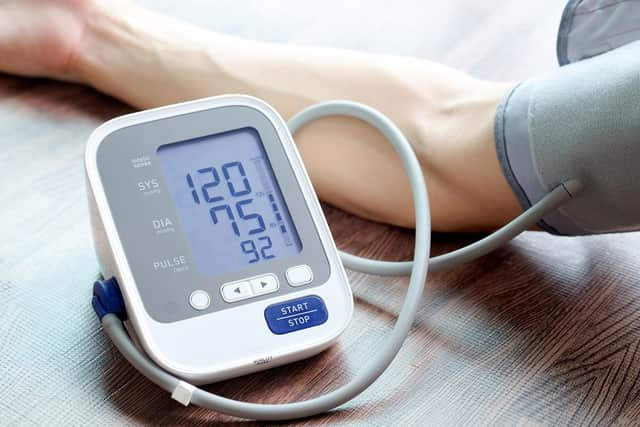Better blood pressure control could spare hundreds of Lancashire residents heart attacks and strokes
and live on Freeview channel 276
That is the finding of academic analysis which estimates that 142 heart attacks and 212 strokes could be averted across the region in the space of just three years if more of those suffering from the condition - which is also known as hypertension - were put on a plan to achieve an optimal blood pressure target.
The research, which was published by the NHS and university collaboration UCLPartners, suggests that avoiding such potentially devastating personal outcomes for individuals would also save the local public purse just over £4m.
Advertisement
Hide AdAdvertisement
Hide AdThe figures were presented as part of a project called the Size of the Prize - launched earlier this year - which has been designed to support the new national Blood Pressure Optimisation Programme. They show the health benefits and savings which could accrue from better-targeted blood pressure treatment in each integrated care system (ICS) area in the country.


Meanwhile, the Local Democracy Reporting Service can reveal that a campaign is set to be launched shortly urging Lancashire and South Cumbria residents to “know their numbers” - the two figures which make up a blood pressure reading.
GP surgeries are also contacting patients who are known to have high blood pressure which is currently not well controlled - with those most at risk being approached first
The Lancashire and South Cumbria ICS estimates that around 40 percent of people with hypertension in the region are unaware of the fact - meaning that the problem remains hidden, perhaps until its most serious potential effects are realised.


Advertisement
Hide AdAdvertisement
Hide AdDr. Andy Knox, associate medical director for the ICS, says that people in such a situation are, unbeknown to themselves, at an “increased risk”.
“The problem with high blood pressure is that it’s silent – you usually don’t know it’s high as most of the time there are no symptoms.
“Across Lancashire and South Cumbria, it is a major priority for public health and the local NHS to work together with our population to ensure everyone has healthy hearts.
“Sadly, at this current time, many people in [the region] are dying prematurely from both heart attacks and strokes compared to England as a whole - and it doesn’t have to be this way.
Advertisement
Hide AdAdvertisement
Hide Ad“We know from the work done by UCLPartners that having better blood pressure for people in our communities will really protect us from poor outcomes - so we’re working on a number of initiatives with our community pharmacists, GP surgeries and public health teams to tackle this.
“If people want to get their blood pressure checked, then they can do so at their local pharmacy or health centre. If it’s high, then this information will be passed on to the practice nurse, providing they are registered with a GP, and advice will be given.
“There are lots of things that can be done to help bring blood pressure down without medication.
“I am confident that our teams, in partnership with the people of Lancashire and South Cumbria, can make a difference in bringing people’s blood pressures down which, in turn, will help prevent heart attacks and strokes so we can all live happier, healthier lives.”
Advertisement
Hide AdAdvertisement
Hide AdThe UCLPartners data on heart attack and stroke prevention over the next three years is based on a suggested ambition for 80 percent of patients with high blood pressure in Lancashire and South Cumbria to receive the correct intervention - that is more than 23,000 additional people compared to the pre-Covid level.
Prior to the pandemic, the proportion being optimally treated in the region stood at 71.5 percent, but - in common with every other part of the country - that figure plummeted during the depths of the Covid crisis, to just 47.1 percent during 2020/21.
That meant that more than 68,000 people were not receiving optimal treatment - or not having their blood pressure checked at all. The risk of that situation going unresolved would have been more than 1,000 extra heart attacks and strokes within three years, according to the UCLPartners analysis.
The collaborative has developed a range of resources which it says will “help primary care transform the management of hypertension and other conditions as we emerge from the pandemic” - as well as clear Covid-related backlogs.
Advertisement
Hide AdAdvertisement
Hide AdThey include providing healthcare staff with the means to help patients better understand conditions like high blood pressure - and to care for themselves accordingly.
Dr. Matt Kearney, executive clinical director for cardiovascular health at UCLPartners, said of the Size of the Prize” programme: “It shows that there is huge potential through this Blood Pressure Optimisation programme to deliver population health improvements at scale.”
WHAT CAUSES HIGH BLOOD PRESSURE?
According to the NHS, high blood pressure is often related to unhealthy lifestyle habits - such as smoking, drinking too much alcohol, being overweight and not exercising enough.
Left untreated, high blood pressure can increase the risk of developing a number of serious long-term health conditions, such as coronary heart disease and kidney disease.
Source: nhs.uk
THE DIGITS THAT MAKE A DIFFERENCE
Advertisement
Hide AdAdvertisement
Hide AdThe charity Blood Pressure UK has developed a general guide to the healthy range for blood pressure levels.
High blood pressure - 140/90mmHg or over
Most doctors use 140/90mmHg as the cut-off point for diagnosing high blood pressure, as this is the point at which the risk of serious health problems increases. Patients exceeding this level may be prescribed medications or advised to make changes to their lifestyle in order to lower their blood pressure.
Pre-high blood pressure - 120/80mmHg up to 140/90mmHg
This level is considered a little higher than it should be - meaning high blood pressure could develop later.
Ideal blood pressure – 90/60mmHg up to 120/80mmHg
This range is regarded as healthy, meaning that there is much lower risk of heart disease and stroke.
Possible low blood pressure - 90/60mmHg or lower
Advertisement
Hide AdAdvertisement
Hide AdLow blood pressure can sometimes cause people to feel faint or dizzy - or could be a sign of another health problem.
Source: bloodpressureuk.org
NUMBERS GAME
If 80 percent of people with high blood pressure in Lancashire and South Cumbria were treated to target…
212 strokes could be prevented within three years, saving up to £3m
142 heart attacks could be prevented within three years, saving up to £1m
Advertisement
Hide AdAdvertisement
Hide AdThat would require an extra 23,696 people to reach an optimal blood pressure level.
But during 2020/21, the pandemic meant that 68,094 fewer patients had their high blood pressure treated to target - with some not being tested at all.
Source: Size of the Prize, Lancashire and South Cumbria ICS region (UCLPartners)
